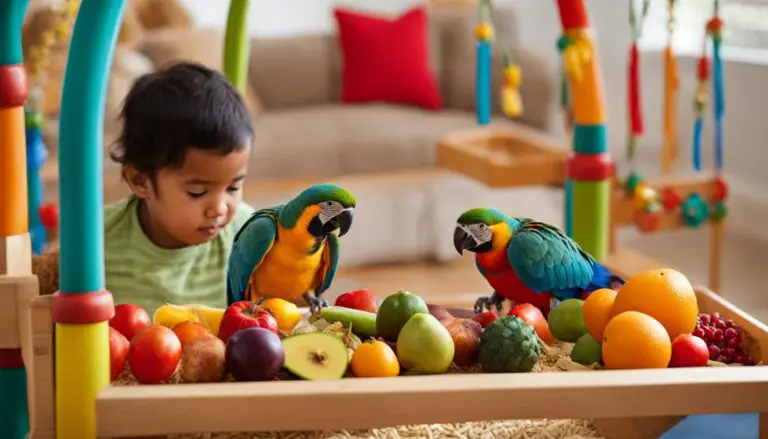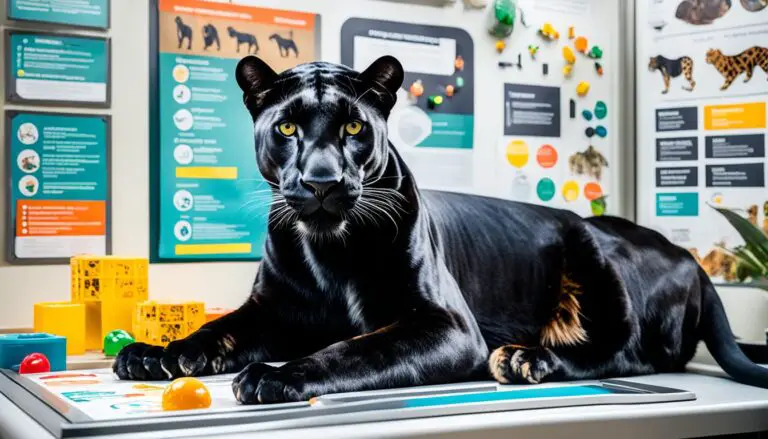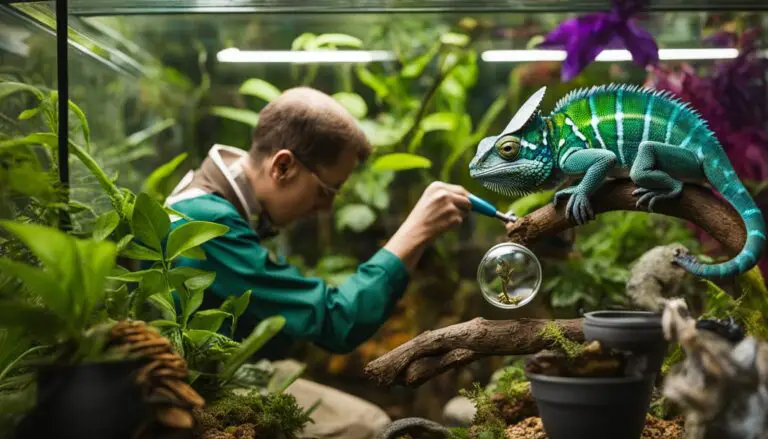Exotic Pet Care for Diurnal Pets: Best Tips
Welcome to our comprehensive guide on exotic pet care for diurnal pets. If you’re a proud owner of an extraordinary creature that follows a diurnal lifestyle, you’re in the right place. Diurnal exotic pets have unique needs and behaviors that require special attention and care. In this article, we will provide you with the best tips and practices to ensure your diurnal pet thrives in its habitat.
From understanding their specific requirements to creating a suitable environment and focusing on proper nutrition, we will cover all the essential aspects of diurnal pet care. Whether you’re a new exotic pet owner or looking to enhance your existing knowledge, this guide will equip you with the knowledge and practical tips necessary to provide the best care for your diurnal exotic pet.
Key Takeaways:
- Exotic pets that follow a diurnal lifestyle require special care.
- Understanding their specific needs and behaviors is crucial for their well-being.
- Creating a suitable habitat and focusing on proper nutrition are essential.
- Enrichment activities and routine healthcare are vital aspects of diurnal pet care.
- Maintaining proper environmental control is crucial for their overall health.
Understanding Exotic Pet Essentials
Before delving into the specifics of caring for diurnal exotic pets, it is essential to understand what makes a pet exotic and the unique needs they have.
Defining Exotic Pets: Diurnal Friends in Your Home
Exotic pets are non-traditional animals kept as companions in households. They can range from reptiles, such as snakes and lizards, to small mammals like sugar gliders and hedgehogs. These captivating creatures bring a touch of the wild into our homes, but their care requirements differ significantly from those of traditional pets like cats and dogs.
Distinguishing Exotic Pet Needs from Traditional Pets
Unlike dogs and cats, exotic pets have specific needs that must be met to ensure their well-being. These needs can include specialized diets, unique housing requirements, and specific environmental conditions. Understanding and catering to these distinctive needs is essential for providing optimal care.
The Importance of Species-Specific Knowledge
Species-specific knowledge plays a vital role in successfully caring for diurnal exotic pets. Each species has its own set of characteristics, behaviors, and requirements. Having a deep understanding of your pet’s species is crucial in providing the appropriate care, maintaining their health, and promoting their happiness. Educating yourself on their natural habitat, diet, social interactions, and daily activities will enable you to create an environment that closely mimics their natural habitat.
By understanding what makes a pet exotic, differentiating their needs from traditional pets, and acquiring the necessary species-specific knowledge, you can provide exceptional care for your diurnal exotic pet.
Customizing Your Diurnal Pet’s Habitat
Creating a suitable habitat for your diurnal exotic pet is crucial for their health and happiness. By customizing their habitat based on their specific needs, you can provide them with a comfortable and stimulating environment to thrive in. Here are the key factors to consider when designing your pet’s habitat:
1. Location: Choose a quiet and low-traffic area in your home where your pet can feel secure. Consider the natural diurnal behavior of your pet and ensure that they have access to natural light during the day.
2. Safety Measures: It is essential to create a safe enclosure to prevent any potential hazards. Ensure that the enclosure is escape-proof and free from toxic plants, sharp objects, or any other items that could harm your pet.
3. Climate Control: Maintain the appropriate temperature and humidity levels within the enclosure to mimic the natural habitat of your pet. Research the specific requirements of your pet’s species and invest in proper heating, cooling, and humidification systems if necessary.
4. Bedding Choices: Choose suitable bedding materials that are safe, comfortable, and easy to clean. Avoid using substrates that may pose a risk of impaction or respiratory issues to your pet. Research the specific bedding requirements for your pet’s species.
5. Resource Access: Provide your pet with a variety of resources such as hiding spots, climbing structures, and suitable perches. These resources will allow your pet to engage in natural behaviors and provide mental stimulation and enrichment.
To further understand the importance of customizing your diurnal pet’s habitat, refer to the image below:

Creating a well-designed and enriching environment for your diurnal exotic pet is crucial for their overall well-being. By considering these factors and providing a habitat that meets their specific needs, you can ensure that your pet is comfortable and thriving in their enclosure.
Feeding Diurnal Pets: Nutritional Best Practices
Proper nutrition is essential for the overall health and well-being of diurnal exotic pets. These unique creatures have specific dietary needs that must be met to ensure their optimal health. By understanding the nutritional requirements of diurnal pets and implementing best practices, you can provide them with the sustenance they need to thrive.
Assessing Diet Requirements: From Herbivores to Carnivores
Diurnal exotic pets can be classified as either herbivores, omnivores, or carnivores, each with distinct dietary needs. Herbivores primarily consume plant-based foods, such as fruits, vegetables, and leafy greens. Omnivores, on the other hand, require a balanced diet that includes both plant matter and animal protein. Carnivores rely predominantly on animal-based foods to meet their nutritional needs.
It is crucial to assess your diurnal pet’s specific diet requirements based on their classification. Research their natural diet in the wild and consult with a veterinarian specializing in exotic pets for guidance. A well-balanced diet that mimics their natural food sources is key to promoting their overall health and preventing nutritional deficiencies.
Avoiding Common Nutritional Pitfalls for Exotic Pets
When it comes to feeding diurnal exotic pets, there are common nutritional pitfalls that should be avoided. One of these is offering inappropriate or inadequate food items. It is essential to provide a varied diet that meets all their nutritional needs. Feeding the same food consistently or relying on low-quality commercial diets can result in nutrient imbalances and deficiencies.
Another common pitfall is overfeeding or underfeeding. Each diurnal pet has specific portion requirements based on their size, age, and activity level. It’s important to accurately measure their food portions and adjust as needed to maintain a healthy weight.
Additionally, be cautious of feeding diurnal pets with foods that are toxic to them. Some fruits, vegetables, and plants can be harmful or even fatal to certain exotic pets. Research and consult with your veterinarian to ensure you are providing safe and appropriate food choices.
Hydration and Its Role in Exotic Pet Health
Proper hydration is crucial for the health and well-being of diurnal exotic pets. Water is essential for maintaining bodily functions and preventing dehydration. Ensure that your pet has access to clean and fresh water at all times.
Some exotic pets may have specific hydration needs, such as misting or bathing. Research your pet’s species to understand their unique hydration requirements and provide appropriate methods to fulfill them.
Remember that the overall health and well-being of your diurnal pet is directly influenced by their nutrition. By assessing their diet requirements, avoiding common pitfalls, and ensuring proper hydration, you can contribute to their longevity and overall quality of life.
Designing Enrichment Activities for Diurnal Pets
Enrichment activities are fundamental in ensuring the physical and mental well-being of diurnal exotic pets. These activities provide stimulation, entertainment, and opportunities for natural behaviors, enhancing their overall quality of life. In this section, we will explore different ways to design and implement enrichment activities for your diurnal pet, helping you create a fulfilling and engaging environment.
One important aspect of enrichment is providing a variety of toys and visual stimuli. Exotic pets, such as birds or small mammals, can benefit from toys that encourage foraging, exploration, and play. Avian pets, in particular, enjoy puzzles that test their intelligence and provide rewards. You can also create visual stimuli by placing mirrors or stimulating images near their enclosure, which can provide entertainment and prevent boredom.
Additionally, diurnal exotic pets often enjoy structures for climbing, perching, and resting. Consider providing branches or platforms for birds to perch on or ropes for primates to swing from. Small mammals, such as ferrets or sugar gliders, can benefit from hammocks or tunnels in their enclosure. These structures mimic their natural habitat and give them opportunities for exercise and relaxation.
When designing enrichment activities, it is important to consider the specific needs and preferences of your diurnal pet. Some pets may prefer interactive toys, while others may enjoy puzzles or objects they can manipulate. Take time to observe your pet’s behavior and provide activities that align with their natural instincts and interests.
Interactive feeding toys are another great way to engage diurnal exotic pets mentally and physically. These toys can be filled with their favorite treats or food, encouraging them to problem-solve and work for their meals. Puzzle feeders with hidden compartments or mazes can be particularly stimulating for pets, requiring them to use their cognitive abilities and explore different methods to access their food.
Remember to rotate and introduce new enrichment activities regularly. This helps prevent habituation and ensures that your pet stays engaged and stimulated. By offering a variety of activities, you provide a dynamic and enriching environment that promotes their natural behaviors and helps prevent boredom and potential behavioral issues.
In conclusion, designing enrichment activities is an important aspect of caring for diurnal exotic pets. By providing toys, visual stimuli, climbing structures, and interactive feeding toys, you can create a stimulating and fulfilling environment that enhances their overall well-being. Take the time to understand your pet’s needs and preferences to tailor the enrichment activities specifically to them, and don’t forget to rotate and introduce new activities regularly. With the right approach to enrichment, your diurnal pet can lead a happy and engaging life.
Healthcare and Veterinary Considerations
Just like traditional pets, diurnal exotic pets require regular healthcare and veterinary attention. It is essential to prioritize their well-being and proactively address any health concerns. Routine health checks and annual examinations are crucial for maintaining the overall health and longevity of your diurnal pet.
During routine health checks, a veterinarian who specializes in exotic pets will assess your pet’s physical condition, check their vital signs, and evaluate any potential health risks. These assessments help detect early signs of illness or underlying health issues and allow for prompt intervention, preventing the development of more serious conditions.
It is important to establish a trusted relationship with a specialized exotic pet veterinarian who possesses the knowledge and experience to effectively care for your diurnal pet.
“Regular veterinary care is essential for diurnal exotic pets to ensure their well-being and catch any potential health issues early on.”
Common health issues that diurnal exotic pets may encounter vary depending on the species. However, some general concerns include respiratory and digestive problems, parasite infestations, dermatological conditions, and dental issues. Understanding the specific health risks associated with your pet’s species is paramount in providing appropriate care and seeking veterinary assistance when needed.
If you notice any changes in your pet’s behavior, appetite, or physical appearance, it is important to consult your exotic pet veterinarian promptly. Timely intervention and appropriate treatment can significantly improve your pet’s chances of recovery.
To promote the well-being of your diurnal exotic pet, it is recommended to maintain a healthy and balanced diet, ensure regular exercise, and provide a stress-free environment. Additionally, be proactive in preventing potential hazards and follow all veterinary care recommendations from your specialized exotic pet veterinarian.
By prioritizing healthcare and veterinary considerations, you can provide your diurnal exotic pet with the best possible care, enhancing their quality of life and strengthening the bond between you and your extraordinary companion.
Exotic Pet Care for Diurnal Pets
Implementing Routine Health Checks
Regular health checks are a vital part of ensuring the well-being of your diurnal exotic pet. By implementing routine examinations, you can monitor their overall health and catch any potential issues early on. During these health checks, it is important to assess various aspects of your pet’s well-being, including their physical condition, behavior, and appetite.
When conducting routine health checks, make sure to:
- Observe any changes in your pet’s appearance, such as weight loss, excessive shedding, or unusual growths.
- Monitor their behavior for signs of distress, lethargy, or abnormal habits.
- Check their eyes, nose, and ears for any discharge or abnormalities.
- Examine their oral health, including their teeth and gums, for signs of decay or inflammation.
- Inspect their skin and coat for any rashes, sores, or parasites.
By regularly performing these routine health checks, you can proactively address any potential health concerns and provide timely care for your diurnal exotic pet.
Understanding Common Health Issues in Diurnal Exotic Pets
While diurnal exotic pets can be a wonderful addition to your household, they are also susceptible to various health issues that may arise. Understanding these common health problems can help you identify symptoms early and seek appropriate treatment. Some of the most common health issues seen in diurnal exotic pets include:
- Respiratory infections
- Metabolic bone disease
- Parasitic infestations
- Digestive disorders
- Skin infections
It is important to familiarize yourself with the signs and symptoms associated with these common health issues. By being vigilant and proactive, you can provide timely intervention and minimize the impact on your pet’s well-being.
When to Seek Expert Advice for Your Exotic Pet
While routine health checks and awareness of common health issues are essential, there may be instances when the expertise of a specialized exotic pet veterinarian is necessary. It is crucial to recognize when your pet’s condition requires professional attention. Some situations that warrant seeking expert advice include:
- Severe or prolonged symptoms
- Unexplained weight loss or appetite changes
- Injuries or trauma
- Behavioral changes, such as aggression or excessive lethargy
- Reproductive or breeding complications
A specialized exotic pet veterinarian has the knowledge and experience to provide tailored care for your diurnal exotic pet. Don’t hesitate to reach out to them when you have concerns or questions regarding your pet’s health.

The Importance of Environmental Control
Maintaining proper environmental conditions is crucial for the well-being of diurnal exotic pets. Their health and comfort depend on factors such as temperature, humidity, and light regulation. By understanding and providing optimal conditions, you can ensure that your pet thrives in their habitat.
Temperature, Humidity, and Light: Getting It Right
Diurnal exotic pets come from various regions with different climates, and it’s essential to replicate those conditions in their enclosures. Maintaining the right temperature is vital, as it influences their metabolic processes, digestion, and overall activity level. Research the temperature requirements of your specific pet and invest in a reliable thermostat to monitor and control the temperature accurately.
In addition to temperature, humidity also plays a crucial role in the health of your exotic pet. Different species have different humidity preferences, and it’s important to provide the appropriate levels to prevent respiratory issues, skin problems, and dehydration. Utilize humidity gauges and misting systems to maintain the ideal levels for your pet’s well-being.
Proper lighting is another essential aspect of environmental control for diurnal exotic pets. Natural light is beneficial, but it may not always be sufficient, especially in indoor enclosures. Supplemental lighting that mimics the natural daylight cycle can help regulate your pet’s circadian rhythm and promote healthy behaviors. Consult with a veterinarian or experienced exotic pet owner to determine the ideal lighting setup for your specific pet.
Safe and Secure Enclosures: Protecting Your Pet
Creating a safe and secure enclosure is essential to prevent escapes, injuries, and exposure to hazards. Exotic pets have specific enclosure requirements, such as appropriate sizes, materials, and features. Ensure that the enclosure is escape-proof and adequately ventilated.
Consider the needs of your pet when selecting enclosure features. For example, arboreal species require vertical space for climbing, while terrestrial species may benefit from hiding spots and tunnels. Provide enrichment items like branches, plants, and appropriate substrates to create a stimulating environment while maintaining safety.
Regularly inspect the enclosure for any potential risks, such as sharp edges, toxic plants, or loose wiring. Remove or fix any potential hazards to ensure the well-being of your pet. Remember to provide a suitable feeding and watering station within the enclosure to promote convenient access to food and water.
Conclusion
In conclusion, providing proper care for diurnal exotic pets requires a combination of knowledge, attention to detail, and dedication. By understanding the unique needs of these fascinating creatures, you can create an environment that promotes their health and well-being.
Responsible exotic pet ownership starts with acquiring species-specific knowledge. It is crucial to research and understand the specific requirements of your diurnal pet, including their habitat, diet, and enrichment needs. Creating a customized habitat with suitable temperature, humidity, and lighting is essential for their comfort and overall happiness.
Furthermore, nutrition plays a vital role in the health of your exotic pet. Take the time to assess their diet requirements based on their classification as herbivores, omnivores, or carnivores. Providing a well-balanced diet and ensuring proper hydration are key factors in maintaining their optimal health.
Regular healthcare and routine health checks are essential for diurnal exotic pets. In case of any signs of illness or behavior changes, it is important to seek expert advice from a specialized exotic pet veterinarian. Your pet’s well-being depends on your attentiveness to their health and prompt action when necessary.
By incorporating these key elements, such as species-specific knowledge, proper habitat customization, nutrition, enrichment, healthcare, and environmental control, you can ensure a fulfilling and happy life for your diurnal exotic pet. Remember, responsible exotic pet ownership is a commitment that requires continuous learning and provision of their specific needs. With proper care and attention, your diurnal exotic pet can thrive and bring joy to your life for years to come.
Source Links
- https://www.happyhealthypets.com/pet-resources/comprehensive-guide-to-caring-for-exotic-pets
- https://www.rspca.org.uk/adviceandwelfare/pets/other
- https://walesanimalclinic.com/exotic-pet-care-101/
Peter Stones is the founder of Exotic Pets Place, the leading online resource for exotic pet care information.
With over 10 years of hands-on exotic pet ownership experience, he is deeply passionate about sharing his expertise to help others properly care for their unusual pets.
When he's not writing extensively researched articles or connecting with fellow exotic pet enthusiasts worldwide, you can find Peter at home tending to his own beloved menagerie of exotic animals.

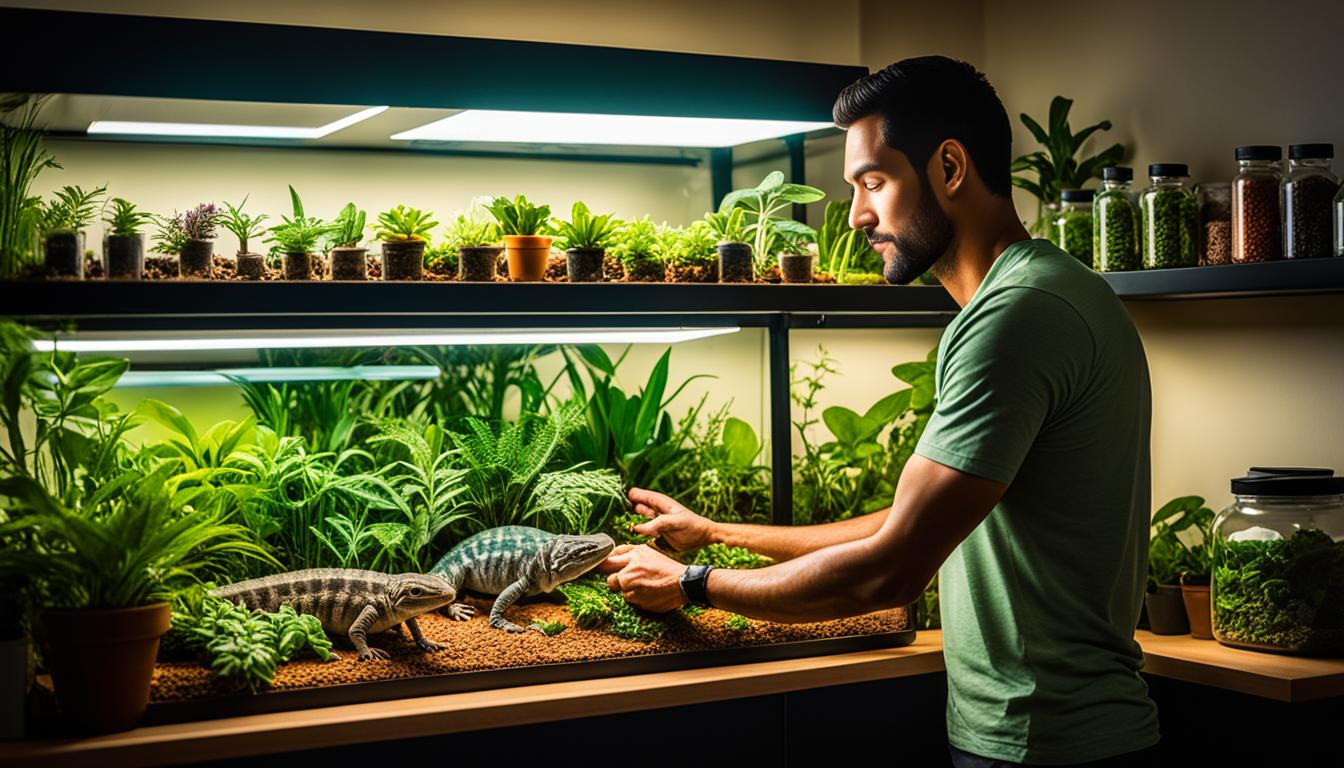
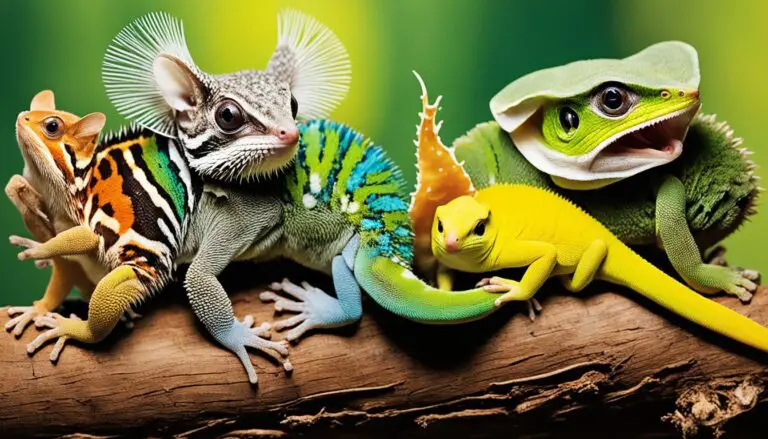
![Making an Exotic Pet More Comfortable in Your House [9 Steps], the inside of a large house](https://exoticpetsplace.com/wp-content/uploads/2023/05/Making-an-Exotic-Pet-More-Comfortable-in-Your-House-9-Steps-the-inside-of-a-large-house-768x576.jpg)
